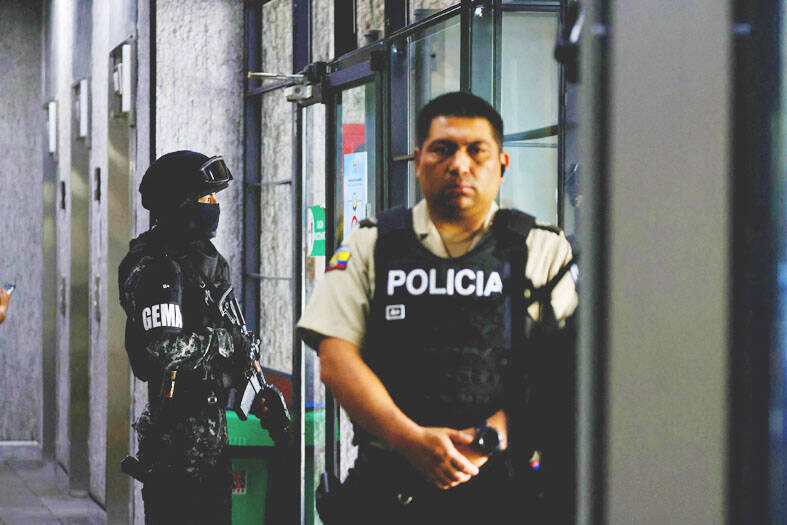At least nine people were shot dead on Saturday while playing pool in a tourist city in southwestern Ecuador, the country’s prosecutor’s office said.
A group of armed men opened fire on several people at a bar in a working-class neighborhood of General Villamil Playas, a coastal city in the southern Guayas province and destination for local tourists.
The Ecuadorian prosecutor’s office wrote on social media that “armed individuals entered the establishment and shot at those present.”

Photo: Reuters
Viral images on social media showed at least nine bloodied bodies lying on the floor around several pool tables.
Local media reports said the attackers were armed with automatic rifles.
At the bar where the massacre occurred, relatives held two coffins on Saturday night. Bullet holes were visible on the pool tables, according to images captured by an AFP reporter.
Police Colonel Jhanon Varela told media that two people were injured in the attack and treated at a local hospital.
Authorities have only been able to identify one body at the scene.
“Unfortunately, when the police arrive, many of those affected by this event are removed from the scene by residents and family members,” Varela said. “It is presumed that there may be more victims.”
Guayas Prefect Marcela Aguinaga said one of the victims was a coach at a provincial football school.
“Violence... seeks to bring us to our knees, silence us, and accustom us to horror. But we will not stay silent. Nor will we surrender,” Aguinaga wrote on social media.
The shooting comes as Ecuador experiences its most violent start to a year in recent history, according to experts.
In the first five months of this year, Ecuador recorded 4,051 homicides, according to official figures.
Drug trafficking organizations have been multiplying in Ecuador, where the homicide rate rose from six per 100,000 residents in 2018 to 38 per 100,000 last year.
Following the recapture last month of the country’s biggest drug lord, Adolfo Macias, alias Fito, after his escape from a maximum-security prison last year, criminal gang violence continues unabated.
This week, in the western province of Manabi, the stronghold of Fito and his Los Choneros gang, at least 20 people were killed in deadly violence in several cities, including Manta, where Fito was recaptured.
Ecuadorian Minister of the Interior John Reimberg announced increased security in Manta, one of Ecuador’s main fishing ports, with 2,500 police officers “deployed at strategic points.”
After his arrest, Fito agreed to be extradited to the US where prosecutors accuse him of cocaine and arms trafficking.
Once considered a bastion of peace in Latin America, Ecuador has been plunged into crisis after years of expansion by transnational cartels that use its ports to ship drugs to the US and Europe.

‘TERRORIST ATTACK’: The convoy of Brigadier General Hamdi Shukri resulted in the ‘martyrdom of five of our armed forces,’ the Presidential Leadership Council said A blast targeting the convoy of a Saudi Arabian-backed armed group killed five in Yemen’s southern city of Aden and injured the commander of the government-allied unit, officials said on Wednesday. “The treacherous terrorist attack targeting the convoy of Brigadier General Hamdi Shukri, commander of the Second Giants Brigade, resulted in the martyrdom of five of our armed forces heroes and the injury of three others,” Yemen’s Saudi Arabia-backed Presidential Leadership Council said in a statement published by Yemeni news agency Saba. A security source told reporters that a car bomb on the side of the road in the Ja’awla area in

‘SHOCK TACTIC’: The dismissal of Yang mirrors past cases such as Jang Song-thaek, Kim’s uncle, who was executed after being accused of plotting to overthrow his nephew North Korean leader Kim Jong-un has fired his vice premier, compared him to a goat and railed against “incompetent” officials, state media reported yesterday, in a rare and very public broadside against apparatchiks at the opening of a critical factory. Vice Premier Yang Sung-ho was sacked “on the spot,” the state-run Korean Central News Agency said, in a speech in which Kim attacked “irresponsible, rude and incompetent leading officials.” “Please, comrade vice premier, resign by yourself when you can do it on your own before it is too late,” Kim reportedly said. “He is ineligible for an important duty. Put simply, it was

SCAM CLAMPDOWN: About 130 South Korean scam suspects have been sent home since October last year, and 60 more are still waiting for repatriation Dozens of South Koreans allegedly involved in online scams in Cambodia were yesterday returned to South Korea to face investigations in what was the largest group repatriation of Korean criminal suspects from abroad. The 73 South Korean suspects allegedly scammed fellow Koreans out of 48.6 billion won (US$33 million), South Korea said. Upon arrival in South Korea’s Incheon International Airport aboard a chartered plane, the suspects — 65 men and eight women — were sent to police stations. Local TV footage showed the suspects, in handcuffs and wearing masks, being escorted by police officers and boarding buses. They were among about 260 South

Syrian President Ahmed al-Sharaa on Sunday announced a deal with the chief of Kurdish-led forces that includes a ceasefire, after government troops advanced across Kurdish-held areas of the country’s north and east. Syrian Kurdish leader Mazloum Abdi said he had agreed to the deal to avoid a broader war. He made the decision after deadly clashes in the Syrian city of Raqa on Sunday between Kurdish-led forces and local fighters loyal to Damascus, and fighting this month between the Kurds and government forces. The agreement would also see the Kurdish administration and forces integrate into the state after months of stalled negotiations on